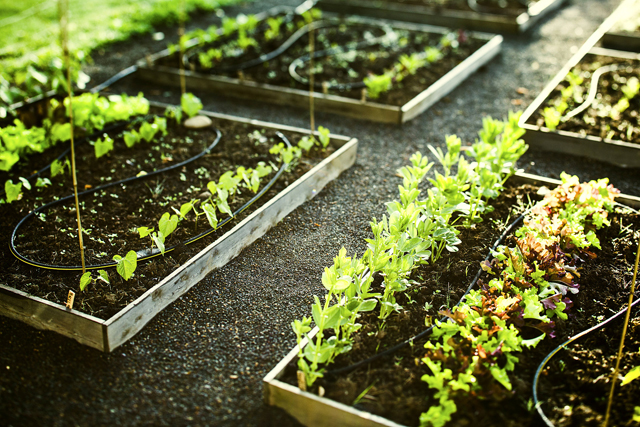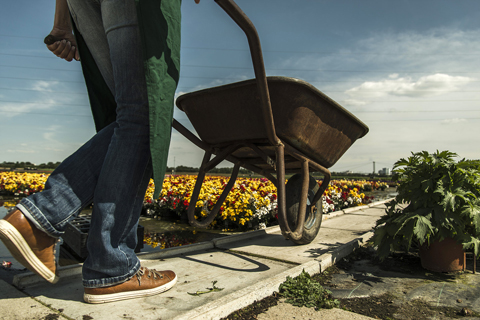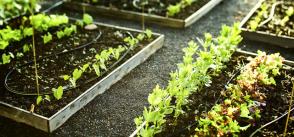
Urban agriculture as an instrument for integration: meet GAPS initiatives
A model of social and labour inclusion of vulnerable subjects through projects of sustainable agriculture.
At the 3rd Euro-Mediterranean Brokerage and Venturing Event held in Bari on 26-27 June 2016, we met Valentina, Antonio and Aldo, who are part of the young team that founded the Association GAPS. Intrigued by their mandate, we wanted to know more about them and their initiatives. Here is our interview with them.
1) Which path led you to found the association GAPS?
GAPS was born informally around a year ago from a discussion among friends with similar interests and heterogeneous competencies such as project mangers, psychologists, lawyers, urban planners, and agronomists. The idea was to provide social assistant and labour inclusion to vulnerable people in Turin, namely asylum seekers, refugees, migrants, and inmates. In this sense, we realised that social farming was a powerful and sustainable way to include those categories. Indeed, the participation of vulnerable people in social farming projects helps them in their socio-economic integration by providing new tools and capabilities as well as strengthening their self-esteem and their sense of belonging to the community.
At the moment GAPS is a registered association and is working on the implementation of three main projects:
 Seeding integration: The focus of the project is to create a rooftop garden on the Kindergarten in the neighborhood of San Salvario. The garden will be use for educational activities targeting children as well as working opportunity for migrants living in the neighborhood.
Seeding integration: The focus of the project is to create a rooftop garden on the Kindergarten in the neighborhood of San Salvario. The garden will be use for educational activities targeting children as well as working opportunity for migrants living in the neighborhood.
Intramurario: The project aims at creating an interactive platform for social and labour inclusion of inmates. Through the platform the cooperation among the different actors involved in the penitentiary administration will be enhanced resulting in a more efficient support to inmates both for their social assistance and labour inclusion.
Cascina GAPS: is the final goal of the Association. It aims at creating a social and economic sustainable farm where vulnerable people will have the possibility to work and access services such as psychological and legal assistant, language workshops and job placement.
2) The project you presented in Bari – Seeding integration - is an interesting example of social entrepreneurship combining urban farming and integration of migrants. Can you tell us something about what is your vision of the city, as a space in general and of Turin, in particular, that underpins the project? How do you see the sustainable city of the future?
With this project we would like to promote a new conception of the urban space based upon the notion of "regeneration" rather than re-qualification.
Urban regeneration not only involves the infrastructural and architectural development of an area but it also requires it to be combined with community building, social inclusion and integration.
In this sense, in order to implement our idea, we strongly relied on the notion of “urban common”, namely the idea that certain urban spaces require to be open to all and governed through an open and participatory mechanism.
This is the vision of the city we have in mind as well as the pathway through which we would like to see our city develops.
 Because of this, in our project we proposed an institutional mechanism –the Community Land Trust – that allows a stewardship of urban areas inspired by the following principles: long-term sustainability (both environmental and economical); access; participatory democracy; preservation of common spaces; intergenerational justice; integration and direct involvement.
Because of this, in our project we proposed an institutional mechanism –the Community Land Trust – that allows a stewardship of urban areas inspired by the following principles: long-term sustainability (both environmental and economical); access; participatory democracy; preservation of common spaces; intergenerational justice; integration and direct involvement.
3) Lastly, though Association Gaps is young, the talent of its founders have been already noted. In August 2015, Association Gaps has been selected to participate in Entrepreneurs for Social Change (e4sc) promoted and funded by Fondazione CRT and United Nations Alliance of Civilisation (UNAOC). Our last question is precisely about social entrepreneurship as a model. What do you think it can bring to the current model of social and economic development?
Thanks to the participation to Entrepreneurs for Social Change, Association GAPS is working toward the development of a social farm based on the social entrepreneurship model.
The strength of social entrepreneurship as a model for social and economic development is the combination of entrepreneurship, innovation and social change as a disruptive force that can trigger virtuous circles of economic growth and social development.
Indeed, social enterprises are companies playing a social role as a mission through the implementation of a sustainable business model, thus focusing on the development of processes and products able to generate social value. Specifically, social enterprises have as their purpose the resolution of a problem of general interest, through the sale of new and/or complementary products and services on the free market, and in which the profits from economic growth are by statute largely reinvested in the enterprise to strengthen and achieve its social mission and defend it from speculative risks. In this sense, social enterprises are able to organize and implement answers to new social needs through strategic, innovative and entrepreneurial solutions.
Finally, the entrepreneurship approach allows measuring actual levels of relevance of social activities and organizational coherence to the social development objectives.







